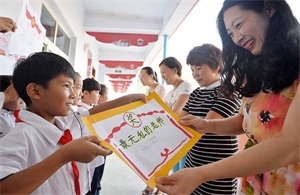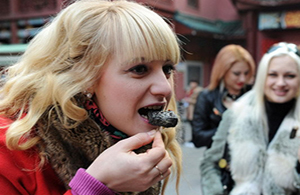Yangshuo:2010 to 2012
By Seneca (Chinadaily.com.cn) Updated: 2012-11-01 15:46Comment on the topic: " we want to hear from you"
Back in the old century the name 'Yangshuo' was the international traveling community's secret for a charming, laid-back and welcoming home-away-from-home in the noisy construction site that China has become since the 1980s. Yangshuo was a village peopled by very cosmopolitan natives who knew what backpackers from Tel Aviv or Toronto craved the most: a clean, affordable pad to crash on, freshly brewed coffee served by a smiling waitress, and the outdoors that have made the River Li famous.
The village comprised little more than West Street, officially named thus in parallel to its Chinese name, plus Pantao Road, which is the through road from Guilin to Wuzhou; plus a street along the bank of the River Li, and just a few lanes. There was a bus station, a post office and a park. The only busy part of Yangshuo was West Street, which was and still is a cobbled road where virtually all cheap guesthouses, cafes and souvenir shops were. West Street is 700 meters long, and back then it was chock-a-block full with amenities catering to Western tastes. Incidentally, it probably was China's first pedestrian zone. The deliverymen still push their motorized tuk-tuks laden with food supplies down the street.
There was one restaurant chain called the "Meiyou Restaurants" with three branches, two of which were on West Street. The very name was a dig at the epitome of 20th century mainland Chinese hospitality professionalism: surly staffers often sneering at their customers: "Mei You", meaning the food the patron had chosen from the menu was "not available" (even if he chose Chinese cabbage, which is served year round!). The Meiyou Restaurants did have EVERYTHING that was PRINTED ON THEIR MENUS - a fantastic proposition to the thousands of Western individual travelers who often became quite a bit disillusioned in China after encountering the ubiquitous "mei you" in the country. Not only did the Meiyou Restaurants have everything printed on their menus - they had great menus that featured muesli, baked bread, mashed potatoes, roast beef - mouthwatering foods offered in a country where breakfasts consisted of rice and oily veggies!
Yangshuo also was one of the very few locales that beckoned people who were eager to hike or bike in the countryside. Renting out bikes was a big sideline of many hotels.
Yangshuo slowly developed into an international holiday destination long before Chinese tourism officials realized the potential of holiday traveling. When US President Bill Clinton arrived in Yangshuo, pictures were published in the media, and hotels put them on the walls of their reception halls.
Up until then, the few intrepid Chinese tourists who did descend on Yangshuo just paid it a token visit to soak up its reputed "international" flair. But that soon changed as tour groups began arriving, with people shooting photographs of shocked foreigners sipping their cappuccinos in front of a cafe on West Street. Westerners were no longer safe from the hordes of camera-toting Chinese on a massive hunt for foreign faces to photograph and proudly show their friends in the rest of China.
The next big change came when several English language training centers followed the lead of Buckland and marketed their English classes to Chinese people who wanted to benefit from the presence of real English speakers. Since then, few foreign visitors to Yangshuo have escaped all the groups of Chinese teenagers eager to interview a foreigner in English, which often is part of their homework assignment.
Eventually Chinese tourism caught up with Yangshuo big time. Now it is a major travel destination. Hundreds of busloads of Chinese tourists get delivered to hundreds of guesthouses and hotels. The old village finds itself in a concrete embrace from all sides, with guesthouses now within walking distance of West Street or as far as 8 kms away. While the intercity bus between Guilin and Yangshuo puts in up to two hours to reach either destination, it used to take only one hour and ten minutes a few years ago.
West Street no longer is the favorite haunt of foreign tourists. Most of the traditional guesthouses and almost all cafes have had to move out as rentals have shot up. Where the Drifter, Red, William and other cafes were, there are now SunCome supermarkets, KTVs, a Watson's, a Disco's and even a KFC. Many stores specialize in retailing fake branded luxury items and accessories.
Westerners still find nice little places to hang out, enjoy the sunshine outdoors and shoot the breeze with fellow travelers or other expats, but it is clear that it is the Chinese masses that bring big yuan to Yangshuo, not the international travelers. There is Guihua Lu that runs parallel to West Street, and this is where you can sit down in a plush sofa inside the Soul Cafe, sip a Bordeaux and smoke an imported cigar! The whole street looks very fashionable in a subdued way. Here some locals have ploughed their savings into decorating a house to suit the tastes of international guests. Houses here are two-story, with nice woodwork in the walls and large windows. Guests here typically stay a week or more, tour the countryside and return to Yangshuo. It is a less money-driven part of Yangshuo; over in West Street foreigners now gawk at the milling masses of wealthy Chinese tourists but they dare not enter that maelstrom.
Yes, there still is a Meiyou Restaurant right on West Street. It is a massive three-story building with wide stairs leading to the dining room upstairs. This is a huge cavern with elegant dining tables and a rich menu. The place is always full with Chinese families, with youngsters sampling some Italian-style espresso. But the name "Mei You" no longer makes sense. There seldom are foreign guests. Indeed, you can now drink a latte in many typical Chinese eateries anywhere in China.
Times and things have really changed.

I’ve lived in China for quite a considerable time including my graduate school years, travelled and worked in a few cities and still choose my destination taking into consideration the density of smog or PM2.5 particulate matter in the region.











